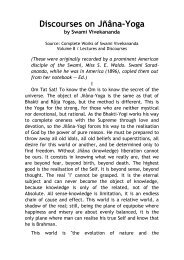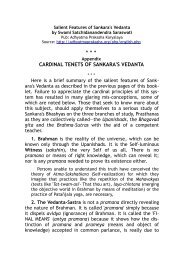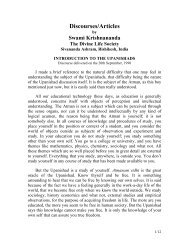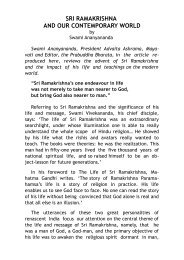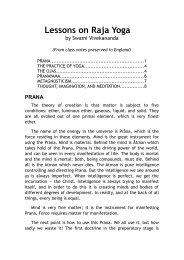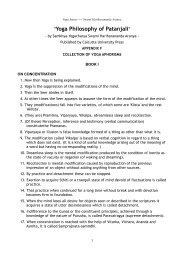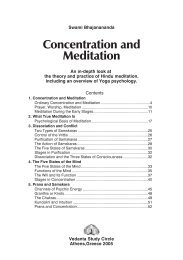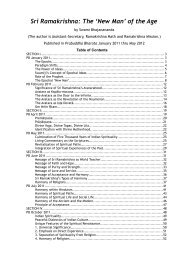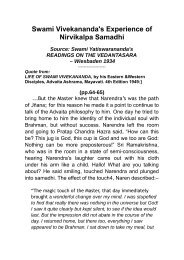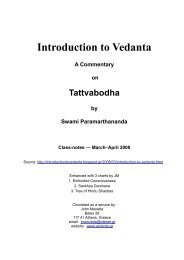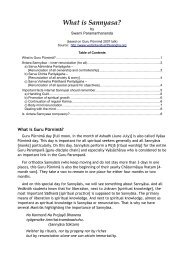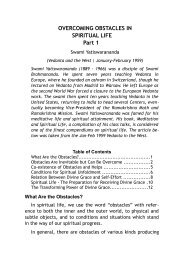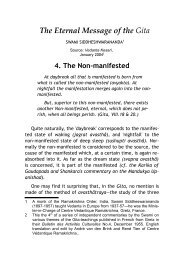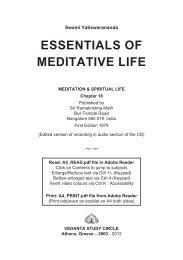Gita Summaries: Chapters 1-11 - Vedanta
Gita Summaries: Chapters 1-11 - Vedanta
Gita Summaries: Chapters 1-11 - Vedanta
Create successful ePaper yourself
Turn your PDF publications into a flip-book with our unique Google optimized e-Paper software.
Swami Paramarthananda on <strong>Gita</strong> – <strong>Summaries</strong> of Chaps 1-<strong>11</strong><br />
a) Devah Yagna: Regular worship of Gods<br />
b) Pitri Yagna: Worship of one’s parents; either dead or alive. (irrespective of whether<br />
they are deserving or not)<br />
c) Rishi/Brahma Yagna: Worship of rishis by regular study of scriptures. One can<br />
honour our scriptures in two ways: either chanting of slokhas or propagation.<br />
d) Manushya Yagna: Service to fellow human beings<br />
e) Bhootah Yagna: Service to lower beings; trees (tulasi) and animals (cow).<br />
II) Sakama Karma: These are Karmas or actions born out of one’s desires. Veda does not<br />
condemn possession of a house, car, and material possessions. But follow these three<br />
conditions:<br />
a) Let all the desires be legitimate (both the ends and means).<br />
b) Let the desires be moderate (allocate some time for spiritual activity also)<br />
c) Let the desires be non-binding (if they are fulfilled, attribute it to the Lord’s grace.<br />
If not fulfilled, accept that too as Bhagawan’s will).<br />
III) Nishida Karma: These are actions one must drop immediately; here and now. You can<br />
wait for an auspicious date or time!!!<br />
What is “proper attitude”<br />
- Perform all actions as Ishwara Arpanam [an offering to God]. This will offset<br />
boredom (everyday you are doing the same thing). With a mind devoted to God, your<br />
actions will not be half-hearted at all but full of enthusiasm. This makes you a<br />
dharmic kartaa [worker]<br />
- Receive everything (karmaphalam [fruits of action]) as Ishwara Prasada [gifts from<br />
God]. Remember what you get is what you deserve. Surrender to the justice of the<br />
world and never ask,” why me” Nobody is to be blamed for your present state except<br />
yourself. You alone are responsible. That makes me a dharmic bhokta [enjoyer].<br />
There is an immediate benefit from such an attitude: I learn to “accept without<br />
resistance”. Resistance is the cause for all sorrow, depression, and fear. When my mind<br />
learns to accept. then it grows in tranquility; from an implicit faith that God can never<br />
be wrong and I am only undergoing my karma.<br />
There are “four” standpoints as to why one must follow Karma Yoga:<br />
a) It is Bhagawan’s commandment or “vidhih” (destiny). We fear the Lord; HE<br />
becomes a threatening figure. This is for the most immature minds; at least do the<br />
right action from fear of God.<br />
b) It is a “Yagna” in which one expresses gratitude to the Lord. The Lord has given us<br />
so many things for our existence – food, water, air, fire, parents, school etc – and the<br />
least we can do is to be grateful. So, think of God or thank God before eating your<br />
meals. Offer that as “naivedyam” [food offering]. Ingratitude is the worst sin for<br />
which there is expiation.<br />
c) It is Dharmah; karma yoga is a harmonising or stabilizing force in nature. I should<br />
take all the time but also start giving. The universe is a cyclical process and we must<br />
8



